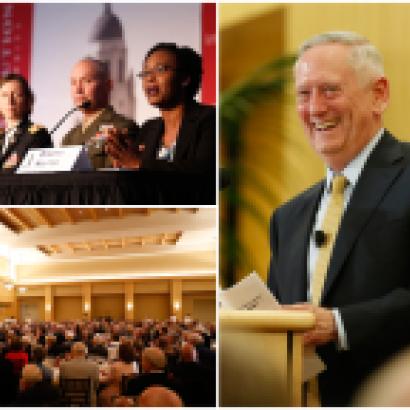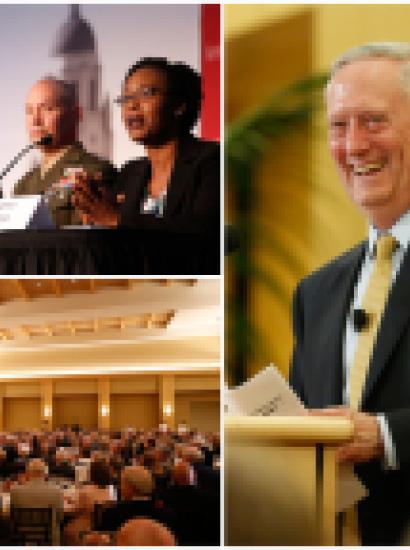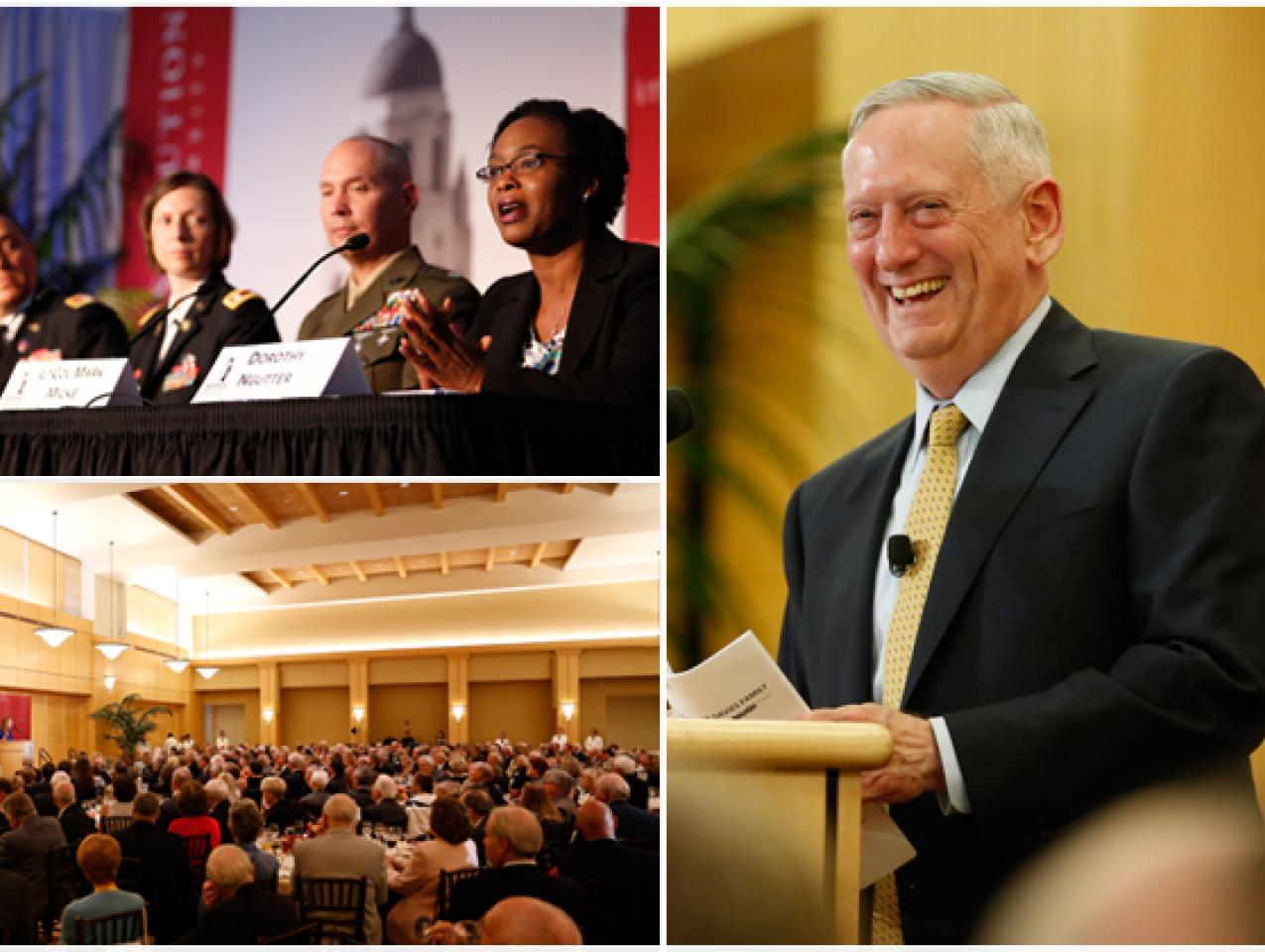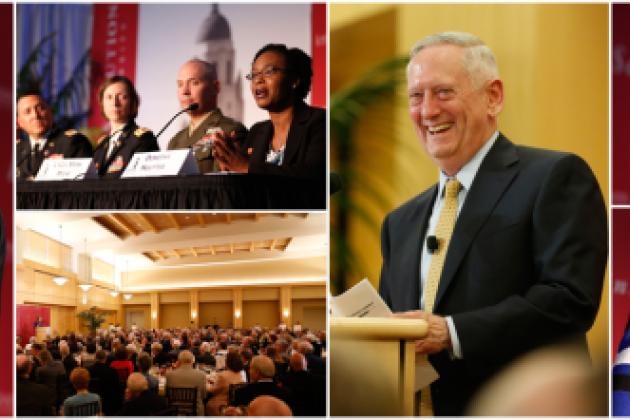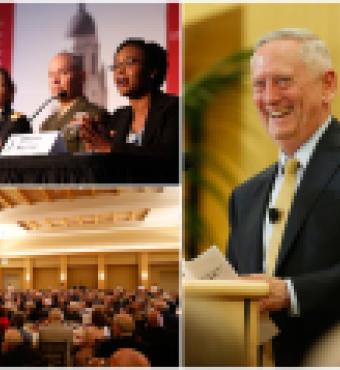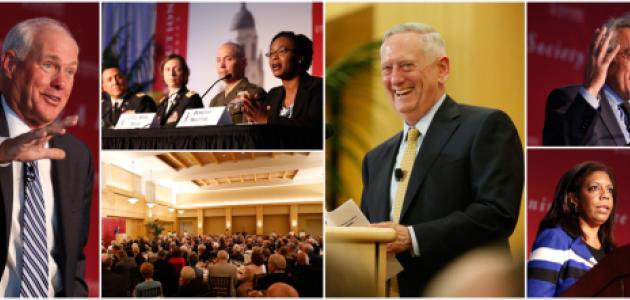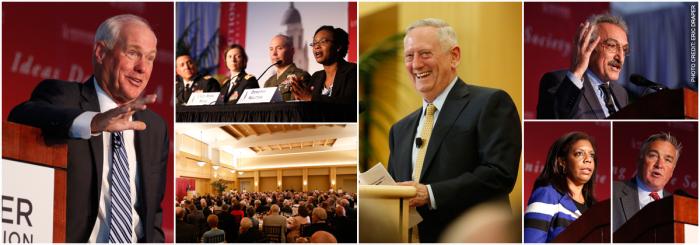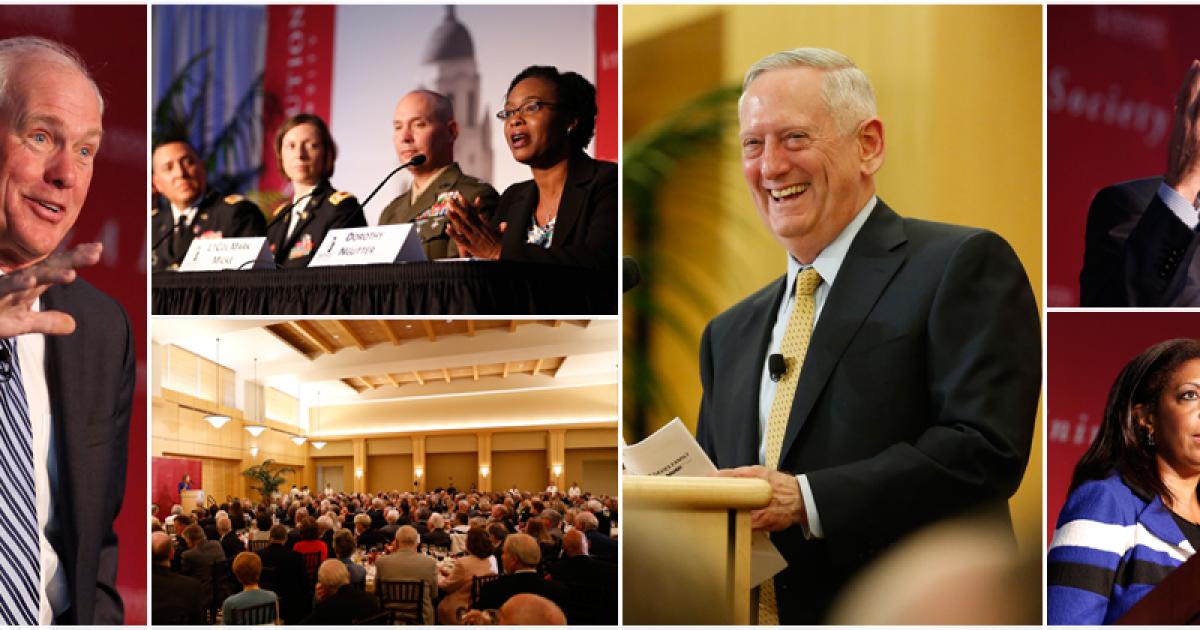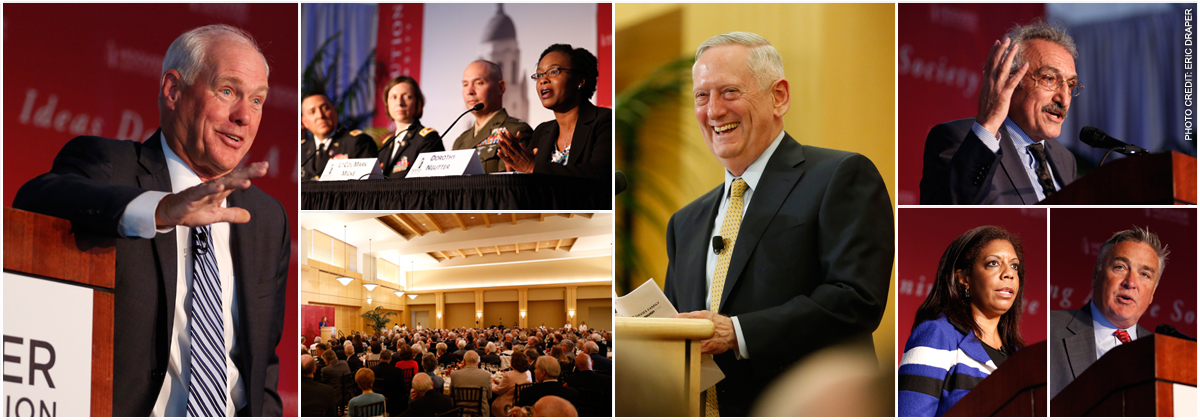
The Hoover Institution’s annual Spring Retreat is a favorite among our highly anticipated donor events, bringing the Institution’s most generous supporters together with the fellows whose work they make possible.
Hoover’s Stanford University campus provides a pleasant atmosphere for informal discussions among supporters and fellows. Holding the event at Hoover’s headquarters also allows attendees to see some of the Institution’s most exciting new initiatives in person.
During the retreat, the Library & Archives opened a new exhibition entitled Civil Discourse: William F. Buckley Jr.’s Firing Line, 1966–1999, showcasing Hoover’s extensive archival collection of materials from the legendary public affairs television show. Private tours of the recently “topped out” David and Joan Traitel Building allowed supporters to witness an important milestone in the building’s construction.
However, the highlights of the event were numerous insightful talks by Hoover fellows on the latest developments in the 2016 presidential race, geopolitical challenges, national security strategies, and domestic issues shaping the national policy conversation. Although Hoover fellows address these topics widely in other forums, the talks at the retreats offer more candid and highly informative perspectives.
We’re delighted to present a number of the most popular talks from the retreat below as audio podcasts. We hope you enjoy, and we invite you to share these recordings with your friends, family, and colleagues.
General Jim Mattis, Davies Family Distinguished Visiting Fellow
What Should We Do About Iran?
In this talk, General Mattis applies his extensive national security and policy experience to current US-Iranian diplomacy. He centers his remarks on the Joint Comprehensive Plan of Action, commonly known as the Iran nuclear agreement, which he views as a serious misstep in US policy. He explains the political and historical context of the deal, analyzes how the Iranian regime is modifying its behavior in response, and how US policy makers can correct course. Although Mattis is measured in his analysis, he draws a stark conclusion: “the Iranian regime is the single most enduring threat to stability and peace in the Middle East.”
Richard A. Epstein, Peter and Kirsten Bedford Senior Fellow
Originalism as Originally Understood: The Uncertain Legacy of Justice Scalia
Much has been said about the legacy of US Supreme Court justice Antonin “Nino” Scalia since he died in February 2016. Renowned legal theorist Richard Epstein—a longtime colleague and friend of Scalia’s—, however, brings something new to the discussion. Epstein frames Scalia’s jurisprudence in the context of western legal thought going back to the Roman Empire. He explains the influence of Roman legal concepts on the US founding, and their relevance to the modern struggle of constitutional interpretation in which Scalia was an influential participant.
Scott W. Atlas, David and Joan Traitel Senior Fellow
Cleaning up the Post-Obamacare Mess: Restoring Quality Health Care at Lower Cost
This talk, which comes on the heels of Atlas’s latest book, Restoring Quality Health Care, brings clarity to the increasingly complex topic of US health-care policy in the wake of the Affordable Care Act. Atlas cuts through spurious metrics to reveal the pre-Obamacare US health-care system as a world leader in delivering quality care. He goes on to explain what the fiscal and regulatory impacts of Obamcare mean for patients and doctors and how the reforms proposed in his book can reduce costs, eliminate regulatory burdens, and promote innovation in health care.
Abbas Milani, Research Fellow
ISIS, Iran, and Saudi Arabia
According to Abbas Milani, crafting cohesive policy to deal with instability and threats in the Middle East requires understanding the ideological, social, and regime-based catalysts of unrest. He explains the return of puritanical Islamist ideology as a reaction to the stagnation of Islamic societies relative to their western counterparts. This trend is not new, but such factors as oil wealth, social media, and communications technology have given it unprecedented strength. Milani stresses that this movement is approaching a dangerous crisis point, one that that, unfortunately, policy makers in the west are failing to adequately address.
Lee Ohanian, Senior Fellow
The Economic Policies of the 2016 Presidential Candidates
President Obama often highlights his administration’s success in spurring a robust economic recovery; Lee Ohanian, however, is less optimistic about the state of the US economy under his leadership. Ohanian argues that Obama’s narrative rests on flawed economic logic and blames the lackluster recovery on a departure of US economic policy from free market principles. With this sober assessment of the current US economy in mind, he explores the potential for improvement under each of the leading 2016 presidential candidates and measures their platforms in terms of promoting freedom, enterprise, and the Constitution.
Herbert Lin, Research Fellow
Punching Back in Cyberspace—the Use of Offensive Cyber Operations as Instruments of U.S. National Policy
Cyber threats from rogue actors, and the need to secure critical digital infrastructure against attack, have earned a prominent role in the US national security strategy dialogue. Most often, the focus of the conversation is defensive. Herbert Lin, however, adds an interesting dimension to the discussion: the potential use of cyber attacks by US agencies to disrupt the operations of our adversaries. Lin explains a menu of options for offensive deployment of cyber tactics but also points out complex political, legal, and ethical implications surrounding their use.
Victor Davis Hanson, Martin and Illie Anderson Senior Fellow
Trump, Class, and the 2016 Election
Donald Trump’s rise as a front-runner in the 2016 presidential primaries may be a surprising development, but according to Victor Davis Hanson, it isn’t without explanation. Hanson discusses why Trump’s radical proposals on immigration and trade are finding receptive audiences who are willing to tolerate his inflammatory rhetoric. Hanson closes with an assessment of what Trump’s candidacy will look like should he secure the Republican nomination, describing the 2016 election as a choice not between good and bad but between bad and worse.







